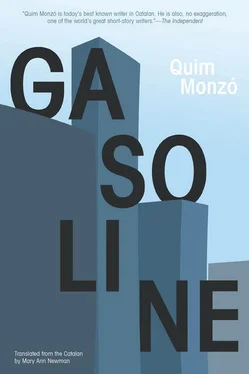Quim Monzó - Gasoline
Здесь есть возможность читать онлайн «Quim Monzó - Gasoline» весь текст электронной книги совершенно бесплатно (целиком полную версию без сокращений). В некоторых случаях можно слушать аудио, скачать через торрент в формате fb2 и присутствует краткое содержание. Год выпуска: 2010, Издательство: Open Letter, Жанр: Старинная литература, на английском языке. Описание произведения, (предисловие) а так же отзывы посетителей доступны на портале библиотеки ЛибКат.
- Название:Gasoline
- Автор:
- Издательство:Open Letter
- Жанр:
- Год:2010
- ISBN:нет данных
- Рейтинг книги:5 / 5. Голосов: 1
-
Избранное:Добавить в избранное
- Отзывы:
-
Ваша оценка:
- 100
- 1
- 2
- 3
- 4
- 5
Gasoline: краткое содержание, описание и аннотация
Предлагаем к чтению аннотацию, описание, краткое содержание или предисловие (зависит от того, что написал сам автор книги «Gasoline»). Если вы не нашли необходимую информацию о книге — напишите в комментариях, мы постараемся отыскать её.
Gasoline — читать онлайн бесплатно полную книгу (весь текст) целиком
Ниже представлен текст книги, разбитый по страницам. Система сохранения места последней прочитанной страницы, позволяет с удобством читать онлайн бесплатно книгу «Gasoline», без необходимости каждый раз заново искать на чём Вы остановились. Поставьте закладку, и сможете в любой момент перейти на страницу, на которой закончили чтение.
Интервал:
Закладка:
Heribert doesn’t answer. He runs out with the bottle of lotion in his coat pocket. He throws the plastic bag on the ground and tries to bounce the ball. Since it doesn’t bounce at all in the snow, he walks along throwing it up in the air and bouncing it off his head. The ball bounces weakly off the hat. A few people stop to stare at him. Not everyone, though, which he finds disconcerting at first, until he reasons that, in fact, it was more logical not to. Why should anyone turn around? He walks past a door in which he can see his reflection. He takes a good look at himself: with those heart-shaped pink glasses, that enormous curly wig, and that beach ball in his hand, he made the perfect shadow. Maybe he could start a new life as a detective. If he could just work up the courage to start over from scratch, doing. . whatever. . He looks closer. Something is missing, something loud: maybe some yellow shoes, plastic ones. Where to get them, though, without losing the couple? If he wants to be a success in this trade, he’ll have to improve his technique. He’ll have to put on a different disguise at every corner. On this block, a fat lady with a dachshund. On the next one, a pirate, with a striped shirt, a bandana, a five-day beard, an eye patch, and a hook for a hand. On the next, an astronaut, eating a lemon ice. And on the next, a tiger with a top hat. . The world was so far from perfection! A little girl passing by points at him. She laughs and pulls on the arm her father was holding her hand with. Heribert lifts his leg as if to give her a good kick. The little girl’s laughter makes many of the passersby turn around, including Helena and her companion. Helena and Heribert look straight at each other, and he is afraid she will recognize him. If she does, he’s lost. Heribert’s and Helena’s eyes meet for an instant, with an intensity that makes him think that not even the dark glasses can keep her from recognizing him. “My eyes,” he thinks. “I should have masked my eyes!” After an unbelievably long second, Helena and glasses smile and go on walking. They hadn’t recognized him! They’d taken him for an eccentric, a madman! He is so pleased he almost runs up to Helena and her companion and takes each of them by the arm to share the joke with him. If they were real people — and not just flesh puppets — they would laugh with him and all three of them would go home, and while four-eyes went to bed with Helena, he would paint thirty paintings in an hour. And then they’d all go out for drinks.
In another window he sees some really baggy pants with a floral print: just the touch he was missing. He goes in, asks for the biggest size they have, pays, says no to a box or a bag, and puts them on right then and there, on top of the ones he’s already wearing. He looks at himself in a mirror: the effect can no longer be improved upon. Playing with the ball, he goes out into the street, not bothering to warn the salespeople (on whose faces he can read the need to break the monotony of the workday by following his progress from the doorway) to stay inside.
Once outside, though, Helena and her escort are nowhere to be seen. He starts to run. Maybe they’ve turned the first corner. He doubts they could have gotten so far in the short time he’s been inside. Just as he thought. They aren’t on the side street, neither left nor right. He goes back. Maybe they’ve gone into a store. But there are no more stores on that side of the street. On the other side, though, are a fish market and a bar. He crosses the street, with the ball in his arms. He has been too cocky. They’re not in the fish market: he can see that from the street, through the clear plate glass. He opens the door to the bar. Indifferent to the gaping of the two winos propped up on the bar, and to the shouts of the owner (who is showing him the door with the index finger of his left hand), he looks the place over and sees that they aren’t there. He goes outside. They are nowhere in sight. They can’t have disappeared just like that, unless (now he sees it, as soon as he turns the other corner, and he looks with hatred at the pole announcing the bus stop) they’re on that bus which he can still see in the distance.
In front of his house, as he pays the fare, the driver asks him if this is where they’re having the costume party.
“Yes. We’re having Mardi Gras a month early and Halloween about two months late. It’s like a sort of equator between the two events. One must always try to find the happy medium.”
As if he could reinforce his words by doing so, Heribert gives him a splendid tip. Leaving the man gaping makes him feel good. Except for the error of losing his prey, the afternoon has been an unexpected success: Helena’s not recognizing him has made him so happy that he claps as he goes into the house. He gets undressed in the foyer and puts the disguise away in a paper bag in the junk closet. In the bathroom he fills the tub with moderately hot water and gets in. He goes under, counting how long he can stay there without coming up for air: one minute, ten seconds.
When he hears her arrive, at 5:35 a.m., he pretends to be sleeping, as always. At nine, the alarm goes off. Helena gets up right away. Heribert opens one eye and sees her, sitting on the bed, stretching. How does she manage to sleep so little and not feel the effects? He closes the one eye when he sees that Helena is turning around to wake him up.
“Heribert. It’s nine o’clock.”
He continues to pretend to be asleep. He hears her get up and shower. He watches her get dressed, on the sly: panties, stockings, bra, blouse, skirt, jacket, shoes. She is a very beautiful woman. Until not so long ago, he could spend hours (maybe not quite hours, but certainly minutes) looking at her eyes, her lips, her eyebrows. Helena picks up her handbag and, before leaving, walks over to him again.
“Lazybones, it’s ten o’clock.”
A moment later he hears her close the door. He yawns, takes over the middle of the bed, stretches out comfortably, and buries his head in the pillows.
He lifts his head and looks at the clock: 11:30. He feels tired. He stays awake until 2:00, when he falls asleep. At 3:23 the phone rings. He fumbles around on the night table. He thinks he’s crushed something hard. A cockroach? He finally finds the telephone. He picks it up. Whenever he happens to think about cockroaches, afterwards, for quite a while, he can’t get them out of his head. Now he’s afraid they’ll start coming out of the holes in the receiver and run into his ear.
It was Hildegarda. What was going on, why hadn’t he called her? They make a date. They arrange for Heribert to stop by at 7:00 to pick her up. He hangs up the telephone and decides to stay in bed until it’s time. He sets the alarm for 6:00.
When the clock goes off, he curses at it. He is so definitively not in the mood to get up that he decides to stay in bed a little longer. To watch the minutes tick by, sees 6:15 come and go, then 6:26, 6:30, 6:37, 6:45, 7:00, 7:15, 7:30. .
He lies there the whole time with his eyes open, staring at the face of the clock. At 7:45 the phone rings again. It’s Hildegarda. Did he fall asleep? Heribert is about to tell her, “I am just not in the mood to get up. .” but he doesn’t, perhaps not wanting to annoy her. Not saying it, though, makes him feel like a coward. Then he thinks maybe it’s not so much that he doesn’t want to hurt Hildegarda’s feelings as that he’s just not in the mood even to speak. This new line of reasoning gives him momentary satisfaction. He gets up slowly. He finds that getting up slowly is good. Slowly he gets dressed. Then, he slowly thinks that he hasn’t showered. On the verge of wondering why he has to shower he manages not to finish the thought. He undresses slowly. He showers slowly. He dries himself off slowly. He closes the front door slowly. Slowly he raises his arm to hail a cab, which, in Heribert’s opinion, approaches too quickly. With measured words he tells the drives to take him to the address as slowly as he can: there is no hurry. When Hildegarda gives him a kiss, he returns it in the slowest of slow motions.
Читать дальшеИнтервал:
Закладка:
Похожие книги на «Gasoline»
Представляем Вашему вниманию похожие книги на «Gasoline» списком для выбора. Мы отобрали схожую по названию и смыслу литературу в надежде предоставить читателям больше вариантов отыскать новые, интересные, ещё непрочитанные произведения.
Обсуждение, отзывы о книге «Gasoline» и просто собственные мнения читателей. Оставьте ваши комментарии, напишите, что Вы думаете о произведении, его смысле или главных героях. Укажите что конкретно понравилось, а что нет, и почему Вы так считаете.












